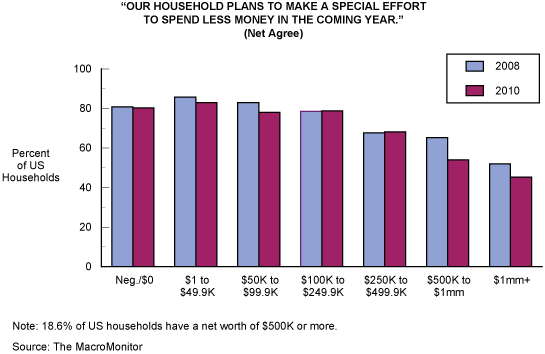MacroMonitor Market Trends July 2011
MacroMonitor Market Trends is a newsletter from Consumer Financial Decisions that highlights topical news and trends of interest to you and your colleagues. If you would like more information about the topic in the newsletter or would like to discuss other ways that we can assist you in your research and marketing efforts, please contact us.
Uh-Oh! Consumer Spending Is Not Coming Back Anytime Soon
Corporate coffers are full while consumers' balance sheets continue to erode. Although investments and retirement accounts have recovered much of their value since late 2008, households' tangibles, especially real estate, continue to decline. Businesses are hesitant to deploy their cash until consumers commit to spend. Most consumers are unwilling to return to the profligate ways that got them into trouble. The situation is a standoff.

Approximately three-quarters (73%) of all households plan to make a special effort to spend less in the coming year—statistically, the same proportion of households that agreed with this statement in the 2008–09 MacroMonitor survey (76%). Only wealthier households—those with a net worth of $500,000 or more—are less likely to agree than previously; they represent less than one-fifth (18.6%) of households that are beginning to spend. However, even among these high-net-worth households, 45% to 54% plan to spend less in the coming year than they spent the year before. For the balance of households (more than 80%), the overwhelming majority plan to spend less in the coming year.
It is highly unlikely that consumer spending will return to prerecession levels anytime in the near future. Recent changes in household balance sheets and current uncertainty about the future have conspired to produce an emotional reaction: the Reverse-Wealth Effect. This effect is the opposite of the Wealth Effect of the 1990s and mid–Uh-Ohs (through 2006) when households experienced significant growth in the value of their assets: securities in the 1990s and real estate in the Uh-Ohs. Because their investments, retirement accounts, and homes were gaining in value, confidence in the stock and real-estate markets was at an all-time high; households felt wealthy and spent accordingly. Not only did households spend discretionary dollars, some even borrowed to spend. Feeling wealthy and confident, households spent more and saved less.
The Reverse-Wealth Effect is the result of an ongoing decline in real-estate values and lack of confidence in investments or retirement accounts. No confidence exists that real-estate values will increase anytime soon; in fact, indications point to a continued decline. Although most securities have regained much of their lost value, few households are confident that these assets will continue to increase in value or even remain at current levels. This lack of confidence produces an emotional reaction. Many households feel less wealthy (poorer) than previously and uncertain about the future. Feeling poor and uncertain, households spend less and save more.
Feelings of being poor will not dissipate overnight. Typically, several postrecession years are necessary to rebuild consumer confidence. Two years have passed since the recession was officially over, and confidence has not yet returned. As the finding above suggests, households with high net worth may start to spend again. However, the majority of households are clearly not ready to open their wallets. Postrecession, many households have shifted to a more pragmatic paradigm—to spend, or borrow to spend, only when essentials such as cars, appliances, clothing, and home repairs require replacement. Some basic level of spending will continue—higher than during the Great Recession (2007 to 2009), but lower than during the period of Conspicuous Consumption (1990s through 2006). Will current generations tell their grandchildren why they should save money as Depression-era grandparents told many of us? Only time will tell.
To learn more about how consumer financial needs, behaviors, and attitudes are changing, contact CFD.